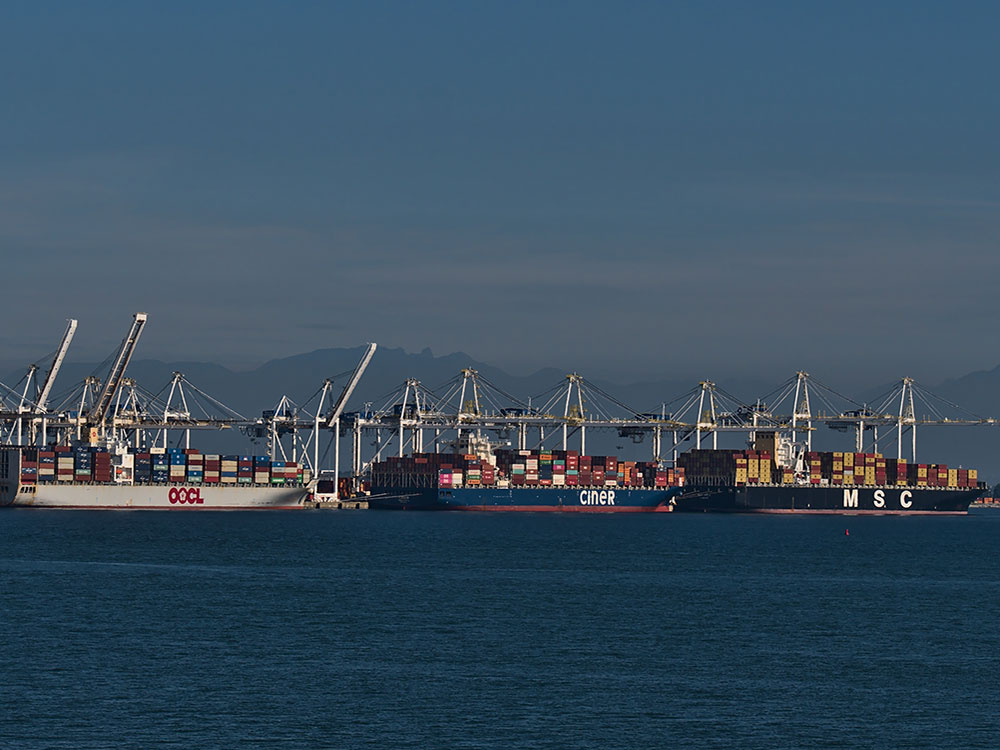Dockworkers at a Lower Mainland container port are still climbing cranes without working elevators despite an initial federal investigation that identified serious safety issues after a worker’s death.
In late January, some employees at Global Container Terminals’ Deltaport site refused to climb the 23 flights of stairs to the top of gantry cranes unless elevators were working. That was about six weeks after maintenance worker Dan Alder died Dec. 14 after experiencing a medical emergency while atop a crane.
The federal Labour Program investigation into his death found six safety violations, including failing to assess the risk faced by workers on its dockside cranes when elevators were not working and failure to develop an adequate rescue plan. The agency ordered changes.
The port, like airlines and rail transport, is federally regulated and the Labour Program is responsible for workplace safety.
But a second investigation by Transport Canada — a different federal department — found there was “no imminent danger” to workers if elevators aren’t functioning.
Transport Canada said its determination was based on “the availability of alternate means of egress from the crane operators’ cabins,” effectively requiring those workers to once again climb the cranes.
Neither of the investigations were released publicly, but The Tyee has obtained documentation about both and confirmed key details with Transport Canada and the company. The union has declined to comment.
One worker on the docks, who asked not to be identified because they feared repercussions from the company and union for speaking about the matter, said the International Longshore and Warehouse Union Local 502 has since appealed that decision. The union would not confirm that it had filed an appeal.
The union had repeatedly warned that first responders would struggle to reach workers on those cranes when the attached elevators were broken.
Chris McLeod, an occupational health and safety expert and a professor at the University of British Columbia, suggested Transport Canada may have examined a different set of criteria than its counterparts in Employment and Social Development Canada, the department that inspects workplaces.
But the fact two different federal departments gave conflicting signals on a worksite where a worker died raises plenty of questions, McLeod said.
“What is the procedure for emergency responders to provide aid? And why isn’t a functioning elevator part of that plan?” McLeod said.
The Labour Program’s initial investigation was sparked by Alder’s death.
He was required to summit the 56-metre staircase multiple times that day while carrying tools. The broken elevator meant a first aid attendant and first responders took longer to reach him.
Later, they placed Alder on a platform used for other maintenance work and lowered him about 13 metres so he would be within range of a cherry picker mounted on the back of a firetruck, which they used to transport him to the waiting ambulance.
Some union members said they had repeatedly warned there was no adequate plan to rescue workers on those cranes when the elevators were broken. The company and the federal government are both investigating the circumstances of Alder’s death.
Days after the federal government’s initial orders were released, workers refused to climb two of the cranes, including the one Alder was on before he died.
ILWU 502, in a written notice to the company, said there was no egress in the event of an emergency and that climbing the crane without a working elevator would delay medical care.
Alex Adams, the marine operations manager for the company, responded that the stairs provided egress and said it was “not unreasonable or unsafe” to request crane operators walk up the cranes. The response does not mention maintenance workers.
“It is the opinion of the employer that the absence of a working elevator does not constitute a hazard,” Adams wrote.
The issue ended up in front of Transport Canada, which regulates elevators. The department sided with the company.
Marko Dekovic, a spokesman for GCT, said the company is working with the union to address safety issues identified by the first investigation done by the federal Labour Program.
ILWU Local 502 president Rick Huburtise declined to comment when reached by phone. The union has not spoken publicly about the circumstances of Alder’s death or the subsequent investigation into it.
McLeod said the company should be transparent about what, if anything, has changed at Deltaport since Alder’s death.
“I think it’s fair to know what those orders were and what the followup was. Because until they’ve been brought into compliance with respect to the orders [from the Labour Program], they’re not complying,” McLeod said. ![]()
Read more: Rights + Justice, Labour + Industry
















Tyee Commenting Guidelines
Comments that violate guidelines risk being deleted, and violations may result in a temporary or permanent user ban. Maintain the spirit of good conversation to stay in the discussion.
*Please note The Tyee is not a forum for spreading misinformation about COVID-19, denying its existence or minimizing its risk to public health.
Do:
Do not: